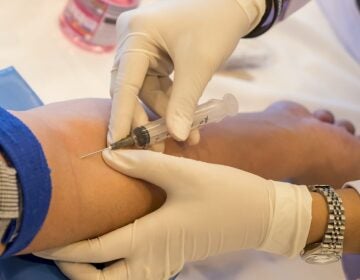Alternative medical treatments popular in Mt. Airy
As human beings, we have our fair share of problems–physical, mental, emotional–we have it all. So what do we most commonly do when something goes awry within ourselves? We head to see a doctor, of course.
Whether our ailment takes us to the emergency room or our primary care physician, most people’s first thought is to visit someone who’s spent at least seven years and countless hours studying anatomy, psychology and microbiology earning a medical degree.
But when conventional medical practices fail us, where do people turn? According to a study by the Centers for Disease Control, 38 percent of American adults and 11.8 percent of American children used complementary and alternative medical practices in 2007. Complementary techniques are used to supplement conventional Western medical practices and alternative medicines replace Western techniques.
Alternative medicine is used as a healing mechanism for a slew of conditions. Most commonly, the modalities are used to heal chronic conditions like orthopedic impairments, hypertension, migraines or sinusitis. However, the techniques have also been known to help people with issues such as infertility, obesity, nicotine addiction and many others.
Such practices differ from traditional western medicine because there is insufficient proof that they are safe and effective– meaning the modalities are not scientifically proven to work. But despite this, between 2002 and 2007, the CDC reported an increased use of methods like acupuncture, deep-breathing exercises, massage therapy, meditation and yoga in adults.
“For the past 150 years there’s been a big emphasis on science [having] the answers to everything and it turns out that’s not the case – there’s more going on,” said Elise Rivers, founder of Community Acupuncture of Mount. Airy (CAMA). “But the marketing of the idea that only unless [something is] proven in a certain way does it have validity, that’s starting to go by the wayside.”
And as a result, Americans are increasingly interested in experimenting with, or even routinely practicing, alternative medicine techniques.
One of the most desirable elements of these modalities is that they practice health holistically. This means they work with the whole person – mind, body and spirit–in an effort to heal the individual and enhance his quality of life rather than focusing on specific symptoms.
“Because it’s mind, body, spirit medicine, people change not only on the physical level but on the emotional level and that’s some of the most exciting parts of the work,” Rivers said. “It goes all the way from the profound to the subtle.”
Often, those interested in alternative medicine are people who have had extensive medical tests but have not had satisfactory experiences, said Sharon Sherman, founder of Chestnut Hill’s Empirical Point Acupuncture.
And due to insurance constraints in western medicine, [doctors] have to specialize, she added.
“When you go to specialists they fulfill this role within these parameters and if it’s outside those parameters, you go to another specialist,” Sherman said. “What we do is we back it out a little bit so it’s not as micro in that sense and [we] look at the many symptoms being thrown off and to try to tease out those threads that go back to a root cause.”
In addition, with the American health insurance system often leaving people uncovered, alternative medicines become more attractive because they are often less costly than conventional methods.
“There’s not great insurance for everyone unless your employer can afford to pay for high-end insurance, so what I’ve tried to do is operate outside the insurance system and basically charge the same price as a co-pay for a complete office visit,” Rivers said.
Becky Kerner is a reporter with Philadelphia Neighborhoods/Temple Multimedia Urban Reporting Lab, a content partner of NewsWorks
WHYY is your source for fact-based, in-depth journalism and information. As a nonprofit organization, we rely on financial support from readers like you. Please give today.




